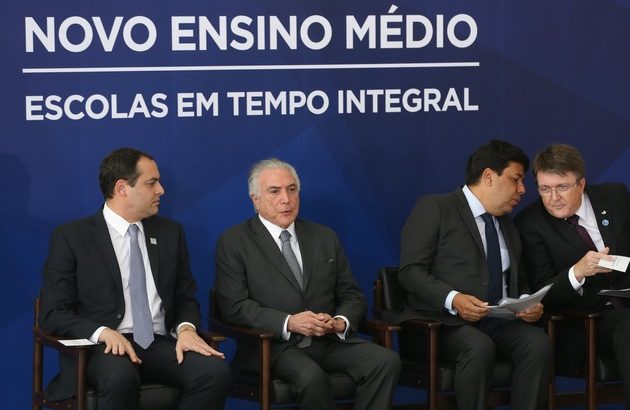América del Sur/Brasil/25 de Septiembre 20176/Noticias/Por: http://www.beijingbulletin.com/
Brazil’s high school reform proposal (for students from 16 to 18 years old) announced Thursday (Sep. 22) by President Michel Temer’s government is being discussed by the country’s education experts and professionals, for whom the provisional presidential decree for the reform requires more investment in the workers’ careers, in schools, and in teachers’ recruitment.
The government’s intention is for high school to have, over the next three years, half the mandatory courses, defined by the National Curriculum Parameters, which is still under discussion. The other half of courses would be more flexible, based on the students’ interests and on the specificity of the public schools in each state of Brazil. Students can choose to follow some paths: languages, mathematics, natural sciences, and humanities.
Learn MoreBrazil government sends high school reform proposal to Congress
For the chairman of the National Council of Secretaries of Education, Eduardo Deschamps, the reform should be as wide as possible to grant the states autonomy, which, according to him, will enable the creation of specialized schools. ‘We’re excited because it’s the first time that the Ministry of Education says that it will respect what each state may have of innovative potential in the process,’ he noted.
The dean of Colamp;eacute;gio Pedro II high school, which is one of the country’s oldest schools, Oscar Halac, considers the reform innovative, but says that a period of adjustment will be needed. ‘As we have no tradition in professionalizing, we will find it hard to adapt. But the fact is that students are distant from schools now, especially in high school,’ he said.
According to Halac, the provisional presidential decree is an attempt to improve the situation, after ‘a few years with no attempt. It is a decision that tries to move [something that has been] in the doldrums. It’s positive. The lack of conditions for this to happen may not be positive,’ he assessed.
He defended that a plan of career and teachers training should be created and added to the new measures, in addition to ‘less expository classes to make lessons more participatory. Currently, schools are not made attractive to compete with the speed that information can be obtained out of
it. This generation no longer settles for sitting five hours on a school bench watching teachers parade repeating well said truths,’ said Halac.
The chair of the Brazilian Union of Secondary Students, Camila Lanes, opposed the lack of discussion with students. ‘Today we are hit by major a crisis in high school that affects schools from public safety to didactic material. Not making the federal government responsible for solving all the problems of public schools, because many problems are within the states’ competence,’ she said.
She admitted, however, that the changes proposed by the government also
have strengths, especially the students’ freedom to choose their courses. ‘The proposal is interesting, we cannot deny it. Nevertheless, we think that the curriculum could be better used for our intellectual and citizen development.’
The leader of the Education Professionals Union of Rio de Janeiro, Marta Moraes, also opppsed the lack of dialogue with the sector. According to her, the union defends a general training of good quality, which gives conditions for the student to choose their profession. ‘At first, this kind of measure seems interesting, but to make that decision without any discussion is very bad. We have problems with infrastructure, enhancement of teachers. We are analyzing the proposal,’ she said.
Fuente:
http://www.beijingbulletin.com/index.php/sid/247940607







 Users Today : 1
Users Today : 1 Total Users : 35459907
Total Users : 35459907 Views Today : 1
Views Today : 1 Total views : 3418466
Total views : 3418466